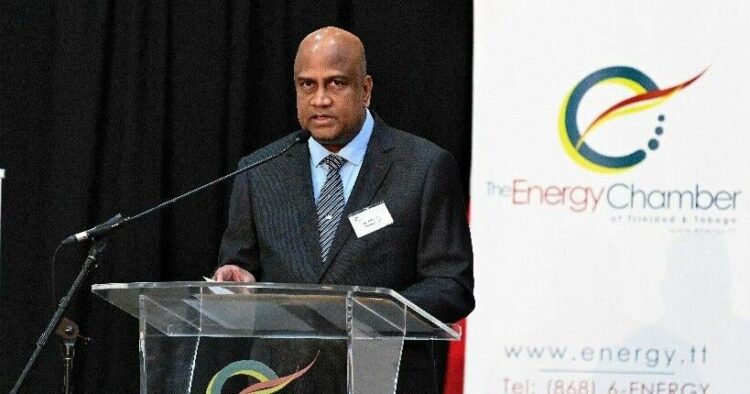BARRIERS to regional integration in the energy services sector need to be removed for the benefit of not only the industry but the entire Caribbean as a whole, chairman of the Energy Chamber of Trinidad and Tobago Jerome Dookie has said.
Among these barriers are the impediments to the free flow of workers and equipment throughout the region, Dookie said.
“One of the most important objectives of the Energy Chamber is greater regional integration in the energy services sector. We believe that there is huge potential to be had by increased trade services within the Caribbean region, and that all companies and countries will ultimately benefit from increased trading services. We need to remove the current barriers that exist…,” Dookie said.
Dookie made the comments during the Energy Chamber’s post-annual general meeting on Friday evening, at the Hyatt Regency (Trinidad), Port of Spain.
He said there is significant potential in linking infrastructure within the region, such as the electrical grids in the Eastern Caribbean to facilitate the trade of energy produced from geothermal sources, as well as gas pipelines to connect the newly discovered resources in Guyana and Suriname with Trinidad’s well-developed gas park.
“There are some tantalising opportunities that exist to connect the potential huge growth in our electricity resources in the Eastern Caribbean with the existing petrochemical industry in Trinidad, which has an unsatisfied demand for low carbon,” Dookie said.
He said this country can provide valuable knowledge and expertise that play a crucial role in unlocking this potential, as evidenced by recent developments involving one of its members.
“In addition to getting our workers to move freely, we need to work on creating uniform qualifications and standards across the region,” Dookie said.
“This is something that is under active discussion between other stakeholders. There are also huge benefits to have if we make the movement of equipment between territories easier.
“If we are able to create a bigger market for large pieces of capital equipment, we will be able to keep these in the region and avoid some of the high costs associated with mobilisation and demobilisation out of places like the Gulf of Mexico within T&T. We have seen the cost of our country’s investment. There is no reason why we can’t extend to more than one country in the region,” he said.
Joanne Brooks, head of the Caricom Single Market and Economy (CSME) and CSME Focal Point for Trinidad and Tobago at the Ministry of Foreign and Caricom Affairs, said that focusing on the free movement regime, the right of establishment, and the right to provide services can empower the workforce and enhance competitiveness.
Brooks showed a video which outlined the importance of the frameworks and said the CSME allows nationals to move freely to 14 member states: Antigua and Barbuda, Bahamas, Barbados, Belize, Dominica, Grenada, Guyana, Haiti (presidential council), Jamaica, Montserrat, St Lucia, St Kitts and Nevis, St Vincent and the Grenadines, and Suriname.
The 12 categories for this framework are university graduates, artists, musicians, sports persons, media workers, nurses, teachers, artists with Caribbean vocational qualifications, holders of associate degrees, household domestics with Caribbean vocational qualifications, security teams and agricultural workers.
“On average, women account for 48% of applicants, and men account for 52% of applicants. T&T has become a leader in implementing the free movement regime within the region; through modernisation and digitisation of its services across the board, including the CSME application platform, our nationals can now apply for a CSME skill certificate from the country of their owners wherever they are,” the video says.
Brooks recalled that at the celebration of the 50th anniversary of the signing of the Chaguaramas Treaty, the decision to implement full and free movement was announced.
“In March, the Ministry of Foreign and Caricom Affairs convened the domestic legislative draft committee, an interministerial committee of 20 senior lawyers which I chaired, to begin the process of amending the T&T domestic legislation, both of the committees are significantly advanced.
“In this regard, T&T is ahead of the curve. As we advance towards a more integrated Caribbean region, let us leverage these frameworks to ensure that our talents find opportunities, ultimately driving our regional economy and energy sector forward,” Brooks said.
She urged the chamber’s members to support the implementation of full and free movement in order to deepen the socio-economic integration of the region.
Suriname producing 70,000 bopd
Director of Downstream and Power at Suriname-based energy company Staatsolie, Eddy Frankel said that country, located in South America, currently has a population of 640,000 (a figure subject to change as a survey is being conducted).
Frankel said onshore production is currently at 6.3 million barrels of oil per year, or 70,000 barrels per day, with an employee base of 1,100.
“We are also into generation. We generate both turbo electricity, using heavy fuel oil and hydroelectricity. Hydropower station, the plant has an installed capacity of 96 megawatts and hydroelectric plan of 139 megawatts. Together, we supply 70% of the electricity market properties, and we also have to pipeline the development of renewable energy,” he said.
Source link : http://www.bing.com/news/apiclick.aspx?ref=FexRss&aid=&tid=671f9fe7b1744a1c85bc2791923b0ac5&url=https%3A%2F%2Ftrinidadexpress.com%2Fbusiness%2Fenergy-chamber-chair-calls-for-regional-integration-in-services-sector%2Farticle_79de6832-9531-11ef-a680-0ba0e18025f5.html&c=5188758505928313048&mkt=en-us
Author :
Publish date : 2024-10-28 02:45:00
Copyright for syndicated content belongs to the linked Source.
